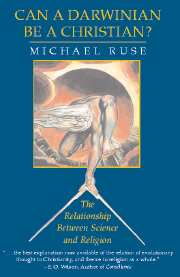Book contents
- Frontmatter
- Contents
- Preface
- Prologue
- CHAPTER ONE Darwinism
- CHAPTER TWO Christianity
- CHAPTER THREE Origins
- CHAPTER FOUR Humans
- CHAPTER FIVE Naturalism
- CHAPTER SIX Design
- CHAPTER SEVEN Pain
- CHAPTER EIGHT Extraterrestrials
- CHAPTER NINE Christian Ethics
- CHAPTER TEN Social Darwinism
- CHAPTER ELEVEN Sociobiology
- CHAPTER TWELVE Freedom and Determinism
- Epilogue
- Bibliography
- Index
CHAPTER ONE - Darwinism
Published online by Cambridge University Press: 05 June 2012
- Frontmatter
- Contents
- Preface
- Prologue
- CHAPTER ONE Darwinism
- CHAPTER TWO Christianity
- CHAPTER THREE Origins
- CHAPTER FOUR Humans
- CHAPTER FIVE Naturalism
- CHAPTER SIX Design
- CHAPTER SEVEN Pain
- CHAPTER EIGHT Extraterrestrials
- CHAPTER NINE Christian Ethics
- CHAPTER TEN Social Darwinism
- CHAPTER ELEVEN Sociobiology
- CHAPTER TWELVE Freedom and Determinism
- Epilogue
- Bibliography
- Index
Summary
It is useful when discussing anything to do with evolution to make a threefold division. We have the fact of evolution, the path (or paths) of evolution, and the mechanism or cause (mechanisms or causes) of evolution (Ruse 1984). By the fact of evolution we mean the development by natural causes of all organisms, those today and those yesterday, from other forms probably ultimately much simpler and originally perhaps from nonliving substances. By the paths of evolution, or (as they are known technically) by the “phylogenies,” we mean the actual tracks that evolving lines of organisms took through time. By the mechanism or cause of evolutionism we mean the force (or forces) actually driving the evolutionary process.
Evolution as Fact
The Englishman Charles Robert Darwin (1809–1882) is the key figure in the history of evolutionism and the key figure in our story. He was not the first evolutionist, in the sense of being the first to propose and argue for evolution as fact. Back in the eighteenth century, his grandfather Erasmus Darwin had believed in naturally caused organic origins, and later there were others, including the early French evolutionist Jean Baptiste de Lamarck (1809), who argued that organisms change because characters acquired during an organism's lifetime can be inherited by descendants (McNeil 1987; Burkhardt 1977). However, Charles Darwin in his On the Origin of Species (1859) was the person who made evolution more than just an idea – more than just a sweeping hypothesis which sounds good but which has little evidential support.
Information
- Type
- Chapter
- Information
- Can a Darwinian be a Christian?The Relationship between Science and Religion, pp. 12 - 32Publisher: Cambridge University PressPrint publication year: 2000
